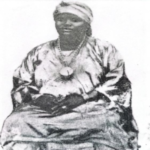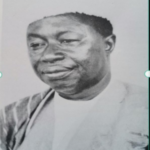Addo-Dankwa I (? – 1838) was the Akuapemhene (paramount chief of Akuapem, a state some 30 mi (48 km) north of Accra, ruling from 1816 -1838. During his reign, relations between Akuapem and Asante went through a period of crises.
During the reign of Addo-Dankwa’s predecessor, Kwao Saforo Twie (ruled 1802-16), a policy of strong resistance to the expansion of Asante power had been followed, in conjunction with the neighbouring state of Akyem Abuakwa to the east, to which Akuapem had been linked by family and dynastic ties since 1730. Addo-Dankwa’s accession, however, marked the ascendancy in Akuapem of pro-Asante interests. The ascendancy of the pro-Asante faction lasted, however, for only a brief period. In 1826, Addo-Dankwa and the ruler of Akyem Abuakwa, Ohemaa (Queen) Dokua, coerced by the British with the support of the anti-Asante faction in Akuapem, played a dominant role in the defeat of Asante at the battle of Katamanso (Akantamasu), or Dodowa, 15 mi (24 km) northeast of Accra, by a coalition of forces. In the battle, Addo-Dankwa captured the Asante stool paraphernalia, or regalia, called Odwira Apafram, used by the Asante to celebrate the Odwira, or Yam Festival every year. Akuapem traditions relate that the celebration of the Odwira Festival in the state dates from 1826. Previously, the Akuapem paramount stool had celebrated the annual festival of Adae Kese, or Great Adae, during which divisional chiefs renewed their oaths of loyalty to the Okuapemhene, who also swore allegiance to the Akuapem constitution.
The most far-reaching event in Addo-Dankwa’s reign was the challenge that he issued to the Basel Missionary Society. Addo-Dankwa who did not believe in the claims of the missionaries, is said to have told Andreas Riis of the Basel Mission in 1835 that if he could show him an African who practised the white man’s religion, then he and his people would accept the Basel Mission. (Riis, coming from the Danish settlement at Christiansborg, at the invitation of Addo-Dankwa, had settled at Akuropon, capital of Akuapem, on March 21, 1835, but had had to return to Christiansborg the following year when Addo-Dankwa changed from Danish to British allegiance). Riis accepted the challenge, and later, after Addo-Dankwa’s death, was to resume the mission’s work in 1843. Meanwhile, however, Addo-Dankwa had been deposed by a pro-Danish faction in 1836, and had died in 1838 of a broken heart, resulting from the intrigues and interference in Akuapem affairs by the Danish authorities at Christiansborg, who were making desperate attempts to revive their influence in the state in the face of growing British hegemony.
M. A. KWAMENA-POH


